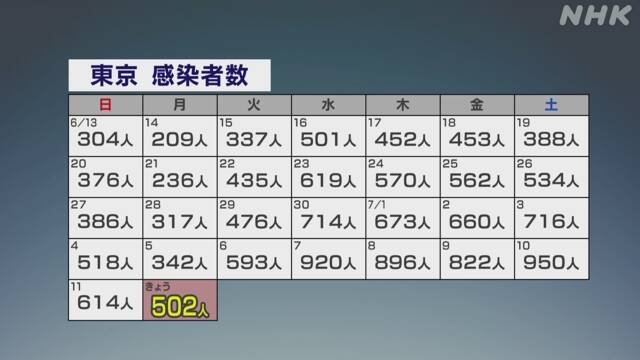Only three weeks after the third state of emergency was lifted in Tokyo, the fourth was issued, with the number of people infected with the new coronavirus not decreasing sufficiently, and the number of infected people per week. The number has been around 1.2 times that of the previous week for more than two weeks, and there are concerns about rapid expansion, and in a few weeks, the number of hospitalized beds has exceeded the number of beds secured. There are times when medical conditions are expected to be tight.
It has been pointed out that the government and local governments have delayed the decision to strengthen measures due to the spread of infection so far, so the government subcommittee decided in April to catch signs of the spread of infection at an early stage and take strong measures. I showed the index.
According to the index, if it is expected that the maximum number of beds secured by the prefecture will reach full in 2 to 4 weeks, strong measures should be taken, and the number of people at night will increase, and the number of infected people will increase. If the number of the last week is significantly higher than the previous week for more than two weeks, it is necessary to take early measures.
The number of people at night remains at a high level
Looking at the situation in Tokyo in light of this, the number of people at night in downtown areas decreased immediately after the third state of emergency was declared on April 25, but after the Golden Week holidays. It has been gradually increasing for 5 consecutive weeks since then, and immediately after the cancellation on June 21, it increased 1.2 times in one week and remains at a high level.
Comparison of the number of infected people with the previous week The increase is remarkable
Comparing the number of infected people per week with the previous week, in Tokyo, after the end of June, the state of about 1.2 times that of the previous week continued for more than 2 weeks, and as of the 12th, it increased to 1.29 times. Is prominent.
The number of infected people per day dropped to an average of 250 per week in early March after the third wave, but on June 15 after the fourth wave, it averaged 375 per week. There is concern that the wave of infection spread will increase as the starting point is high, as it has started to increase from a state where it has only decreased to the maximum.
The sickbed may be tight for more than 3 weeks
Furthermore, it is estimated that if strong measures such as a state of emergency are not taken, the bed may become tight in about three weeks from now.
According to a simulation shown by Associate Professor Yuki Furuse of Kyoto University at an expert meeting of the Ministry of Health, Labor and Welfare on the 7th of this month, if strong measures are not taken, the number of infected people per day in Tokyo will be 2000 in the end of this month. It is estimated that the number of hospitalized patients will exceed the 6,000 beds secured by the city by the beginning of next month.
Shigeru Omi, Chairman of the Subcommittee of the government, in the conference of the 4 th of emergency declared the issue that is fixed this month 8 days,
▽ mutant virus has been identified in a strong infectious India "delta strain" is in the metropolitan area 3 It is estimated that it accounts for more than 10%, and the replacement is progressing rapidly.
▽ In Tokyo, the increase in the number of severely ill elderly people who are vaccinated is suppressed, but the vaccination is not progressing. The number of seriously ill people in their 50s has increased beyond the peak of the "fourth wave" of the spread of infection in spring, and the number of
people moving across regions such as the four consecutive holidays, summer vacation, and the Tokyo Olympics will increase rapidly. He showed some concerns, such as the concentration of timing to do so.
He also expressed a sense of crisis, saying, "The effect of vaccination is still far away, and if the infection spreads as it is, there is a high possibility that medical care will be tight."

